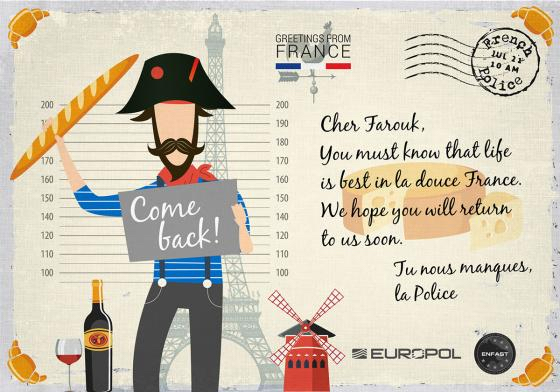Europeans send jaunty postcards to apprehend most-wanted criminals

Screenshot from eumostwanted.eu.
As people flock to the European Union’s vacation spots this summer, one law enforcement agency wants fugitives to come back home.
Through a series of cheeky yet serious postcards, the European Union Agency for Law Enforcement Cooperation, Europol, expects a new crowdsourcing effort will find criminals on the lam.
In a press release, Europol makes its pitch for the untraditional approach saying, “Holiday destinations have proven to be popular hiding places for criminals on the run from law enforcement. They might even have chosen the same destination as you…” The release continues, “That’s why your information can be vital to catch some of Europe’s Most Wanted fugitives.” The postcards target convicted or suspected criminals in 21 of the 28 EU member countries.
Created with the European Network of Fugitive Active Search Teams, the postcards have all the trappings of one a tourist would buy on the Black Sea or in the Austrian Alps. The one difference is that the police already wrote the note.
“Ciao Marco,” reads one addressed to an Italian man found guilty of a litany of charges including arson and attempted murder. “Don’t you miss the taste of authentic Italian cuisine, prepared with love from someone who really loves you? Come back to the sun-kissed shores of Italy for a truly authentic (food) experience that you’ll never forget!” It is signed by the Italian Department of Public Safety.
Another postcard addressed to a Serbian national named Ivan under investigation for armed robbery in Cyprus says, “We are inviting you back to Aphrodite’s island. The beach is full of oysters, pearls, and us waiting for you.”
While tongue-in-cheek, Europol reports that crowdsourcing campaigns have proven effective in the past. Since launching eumostwanted.eu in early 2016, the site has had 2.5 million unique visitors. Thirty-six of the individuals on the list have been apprehended so far. Eleven of those were captured “as a direct result” of information from the public, according to Europol.



